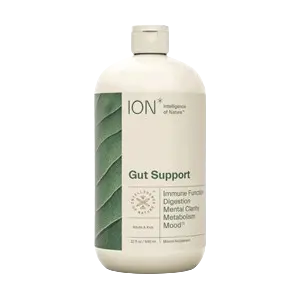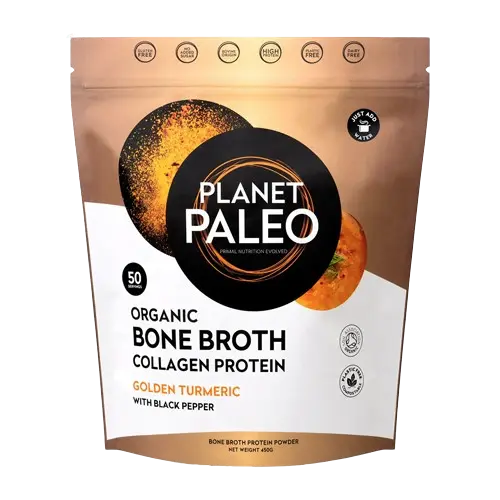This post contains affiliate links. Read my full diclosure HERE.

The concept of the gut being our “second brain” has gained significant attention. This idea stems from the intricate connection between our digestive system and overall health, including the condition of our skin.
You might have heard the saying, “Beauty comes from within,” but did you know this could be quite literal?
Understanding how gut health influences skin condition can offer valuable insights into improving our appearance and well-being.
Understanding the Gut as the "Second Brain"
The gut is home to a complex network of neurons, known as the enteric nervous system (ENS). This system is so sophisticated that it can function independently of your central nervous system, earning it the nickname “second brain.” The ENS oversees every aspect of digestion, from breaking down food to absorbing nutrients, and even communicating with your immune system.
Digestion: The gut’s primary role is to break down the food we eat into nutrients that our body can use. This involves a delicate balance of stomach acids, enzymes, and beneficial bacteria working together to convert food into energy and essential building blocks.
Immunity: About 70% of your immune system resides in your gut. A healthy gut microbiome—a balanced community of microorganisms—supports this immune function, keeping you healthy from the inside out.
Nutrient Absorption: Once food is broken down, the nutrients are absorbed through the gut lining into the bloodstream. These nutrients include vitamins and minerals vital for skin health, such as vitamins A, C, D, and E, as well as zinc and omega-3 fatty acids.
The Gut-Skin Axis
The gut-skin axis is a concept that highlights the connection between your gut microbiome and your skin’s health. Research has shown that the state of your gut microbiome can directly influence your skin condition. A balanced gut microbiome promotes healthy, glowing skin, while an imbalanced one can lead to various skin issues.

When the gut is imbalanced, a condition known as dysbiosis occurs. Dysbiosis can increase gut permeability, or “leaky gut,” allowing toxins and undigested food particles to enter the bloodstream. This triggers inflammation throughout the body, including the skin, leading to conditions like acne, eczema, and rosacea.
Inflammation and the Gut
Chronic inflammation is a major factor in many skin conditions. When your gut is unhealthy, it can lead to systemic inflammation. This happens when the gut lining becomes compromised, allowing harmful substances to leak into the bloodstream and trigger an immune response. This immune response can manifest as skin inflammation, causing redness, irritation, and outbreaks.
Diet and Gut Health
Diet plays a significant role in maintaining a healthy gut. Foods high in fiber, such as fruits, vegetables, and whole grains, support a healthy gut microbiome.
Fermented foods like yogurt, kefir, and sauerkraut provide beneficial probiotics that help balance gut bacteria.
On the flip side, diets high in processed foods, sugars, and unhealthy fats can disrupt gut microbiome, leading to inflammation and poor skin health.
Reducing sugar intake is especially important, so follow my 10 Easy Steps to Quit Sugar as soon as possible.
Nutrients for Skin Health: The nutrients your gut absorbs are crucial for maintaining healthy skin. Vitamins like A, C, and E are essential for skin repair and protection, while omega-3 fatty acids help maintain the skin’s lipid barrier, keeping it hydrated and resilient.
Collagen: A healthy gut also plays a significant role in improving collagen production. When your gut is balanced and functioning well, it helps in the efficient absorption of nutrients that are essential for collagen synthesis. Collagen is a protein that provides structure to your skin, keeping it firm and smooth. Improved collagen production can reduce the appearance of cellulite by strengthening the connective tissues beneath the skin. This leads to firmer, more elastic skin and a smoother overall appearance. Taking Collagen in Powder Form will be beneficial for maintaining gut health and achieve skin beauty.
You can help your body make more collagen by eating real food, rich in vitamin C, zinc, and copper. There are high quality vitamins like THIS liposomal vitamin C from PIQUE.
Hormonal Balance and Gut Health
Hormonal balance is intricately linked to the balance of good bacteria in your gut. The gut microbiome influences the production and regulation of various hormones, including those that impact skin health, such as estrogen, testosterone, and cortisol.
An imbalance in gut bacteria can lead to hormonal imbalances, which can manifest in the skin as acne, oily skin, and other dermatological issues.
A healthy gut helps maintain hormonal balance, reducing the likelihood of hormone-related skin problems. By supporting a balanced gut microbiome through diet and lifestyle choices, you can help keep your hormones—and your skin—in check.
The Importance of Hydration
Hydration is key to both gut and skin health. Drinking plenty of fluids supports digestion and nutrient absorption, ensuring that your skin gets the hydration it needs from the inside.
Proper hydration also helps maintain the gut lining, preventing issues like leaky gut.
The Role of Probiotics and Prebiotics
Probiotics and prebiotics are powerful allies in maintaining gut health.
Probiotics are beneficial bacteria found in fermented foods like yogurt, kefir, or fermented vegetables like sauerkraut. They help maintain a healthy balance of gut bacteria, which in turn supports your skin health.
Prebiotics, found in foods like garlic, onions, and bananas, feed these good bacteria, promoting a healthy gut environment.
Scientific studies have shown that probiotics can improve skin conditions by reducing inflammation and strengthening the skin barrier. Incorporating these into your diet can lead to clearer, healthier skin.
Managing Stress for Better Gut and Skin Health
Stress has a profound impact on both gut and skin health. High stress levels can disrupt the gut microbiome and increase gut permeability, leading to inflammation. Additionally, stress can increase cortisol levels, which can exacerbate skin conditions like acne.
Managing stress through techniques like meditation, exercise, yoga, and adequate sleep is crucial for maintaining both gut and skin health
Conclusion
In conclusion, the health of your gut plays a crucial role in the condition of your skin.
By maintaining a balanced gut microbiome through a healthy diet, proper hydration, stress management, and incorporating probiotics and prebiotics, you can achieve clearer, healthier skin.
Remember, true beauty starts from within. Prioritize your gut health, and your skin will thank you.
Note: Always consult with your medical professional before making any health-related decisions or implementing significant changes to your diet.
Let's connect
Sign Up for news and special offers
+ get our FREE guide!
Thank you!
You have successfully joined our subscriber list.
Check your email!





